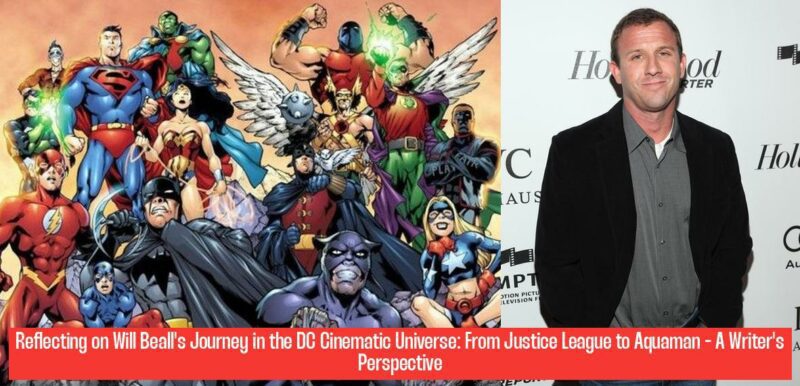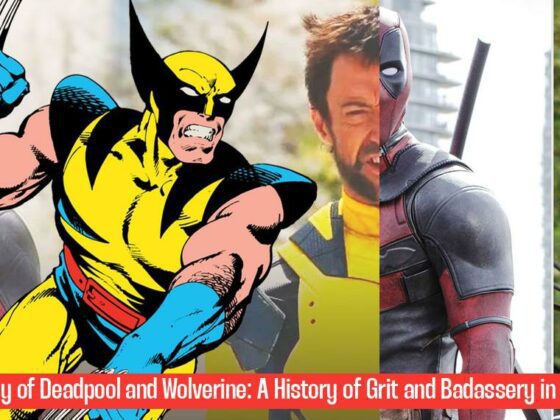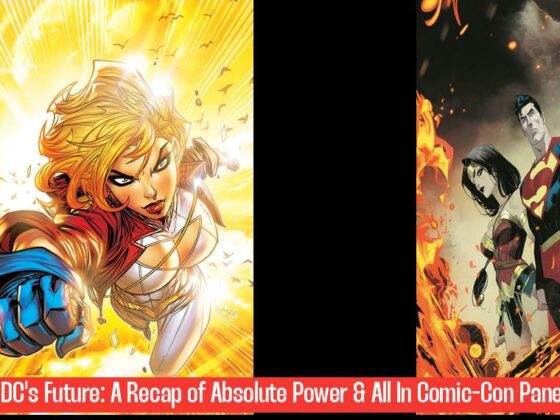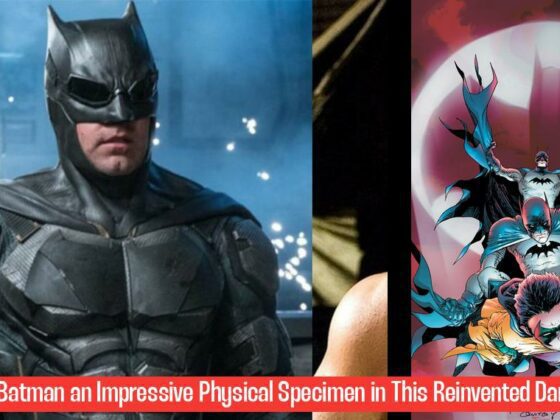Will Beall’s Journey Through DC’s Cinematic Universe: From “Justice League” to “Aquaman”
The world of comic book adaptations has captivated audiences for decades, and DC Comics has been at the forefront of this cinematic revolution. With a pantheon of iconic characters and storylines, DC has graced the silver screen with numerous blockbuster films, each leaving an indelible mark on the genre. One screenwriter who has delved into the depths of DC’s cinematic universe is Will Beall, the talented wordsmith behind films like “Gangster Squad,” “Bad Boys for Life,” and “Beverly Hills Cop: Axel F.” In a recent interview, Beall took a trip down memory lane, shedding light on his experiences working on DC projects, particularly his early involvement with the “Justice League” film.
Beall’s journey into the DC universe began with a call from Warner Bros. in 2012, where he was tasked with writing an early draft of the much-anticipated “Justice League” film. At the time, the project was still in its infancy, and the studio was eager to assemble a team of talented writers to bring this epic ensemble film to life. Beall, known for his sharp dialogue and action-packed narratives, seemed like a natural fit for the job. He embraced the challenge with enthusiasm, diving headfirst into the world of DC’s most powerful heroes.
In his interview, Beall reminisced about his time working on the “Justice League” script, revealing that his initial vision for the film was heavily influenced by the iconic time-traveling adventure “Back to the Future II.” He envisioned a story that would transport the Justice League through time, perhaps to confront a formidable threat that could only be defeated by harnessing the power of the past. While Beall’s “Back to the Future” inspired draft ultimately didn’t make it to the screen, he revealed that some of his ideas found their way into Zack Snyder’s “Justice League” – a testament to the enduring influence of his early work on the film’s final product.
Beyond his early “Justice League” work, Beall has also been involved in other DC projects, including the 2018 blockbuster “Aquaman.” This film, directed by James Wan, showcased the underwater adventures of Arthur Curry, the half-human, half-Atlantean ruler of the underwater kingdom of Atlantis. While Beall didn’t pen the final script for “Aquaman,” he contributed significantly to the initial development of the film, helping to shape the story and characters that would captivate audiences worldwide.
In his interview, Beall expressed his deep admiration for Geoff Johns, the renowned comic book writer and former president of DC Entertainment. He highlighted the collaborative and enriching nature of working with Johns, emphasizing that he had a truly enjoyable experience collaborating with him on their shared DC projects. Beall’s gratitude and appreciation for Johns’ contributions to the DC universe are a testament to the respect and camaraderie that exist within the creative circles of this iconic franchise.
Beall’s “Justice League” Draft: A Time-Traveling Adventure
Will Beall’s early “Justice League” draft, inspired by “Back to the Future II,” presented a unique and intriguing premise for the film. Imagine a scenario where the Justice League, facing an unprecedented threat, is forced to delve into the annals of time to uncover a solution to their predicament. Beall envisioned a story that would weave together elements of time travel, superhero action, and perhaps even a touch of dark humor, similar to the comedic elements found in “Back to the Future II.”
While Beall’s draft didn’t make it to the screen in its original form, some of his ideas found their way into Zack Snyder’s “Justice League.” This highlights the enduring influence of early drafts on the evolution of major film projects. The writers and directors who work on these films are constantly revising, refining, and shaping the story, incorporating elements from various drafts to create the final product that we see on screen.
Beall’s “Justice League” draft offers a glimpse into the creative process behind these massive superhero films. It demonstrates that even when a script doesn’t make it to the final cut, the ideas and concepts that are developed during the pre-production process can still have a lasting impact on the film’s direction and tone. In this sense, Beall’s early “Justice League” draft can be seen as a hidden treasure, a testament to the creative energy and imagination that fuels the world of comic book adaptations.
The “Justice League” film, both in its original theatrical release and in the Snyder Cut, has been a subject of much discussion and debate among fans. The film’s complex narrative, its portrayal of iconic characters, and its exploration of themes of heroism and sacrifice have ignited passionate conversations about the film’s strengths and weaknesses. Beall’s early draft serves as a reminder that the creative process behind these films is often a collaborative effort, involving contributions from multiple writers and directors, each bringing their unique perspective and vision to the project.
The enduring legacy of “Justice League” is a testament to the power of storytelling and the enduring appeal of DC’s iconic heroes. Whether you’re a longtime fan of the comics or a newcomer to the world of superhero adaptations, the “Justice League” film offers an unforgettable cinematic experience that will leave you pondering the nature of heroism, the weight of responsibility, and the enduring power of hope.
Beall’s Contributions to “Aquaman”: Shaping a King’s Destiny
While Beall’s involvement with “Aquaman” may not be as well-known as his work on “Justice League,” his contributions to the film were nonetheless significant. Beall was involved in the early development of “Aquaman,” working with the creative team to shape the story and characters that would ultimately appear on screen. His insights and ideas helped to lay the foundation for the film’s unique blend of action, adventure, and mythology.
“Aquaman,” directed by James Wan, was a critical and commercial success, exceeding expectations and earning over $1 billion at the global box office. The film’s success can be attributed in part to its compelling story, its stunning visual effects, and its charismatic lead performance by Jason Momoa. Beall’s contribution to the film’s early development further underscores his versatility as a screenwriter, demonstrating his ability to adapt to different genres and cinematic universes.
The success of “Aquaman” also highlights the growing popularity of DC’s character-driven films. The studio has moved away from its earlier attempts to emulate the success of Marvel’s interconnected cinematic universe, focusing instead on developing individual stories that showcase the unique strengths and personalities of each character. “Aquaman” is a prime example of this shift, offering a unique and captivating story that stands on its own merits, independent of other DC films.
“Aquaman” also marked a significant step forward in the realm of CGI and visual effects. The film’s underwater world was rendered with stunning realism, immersing audiences in a fantastical realm of shimmering coral reefs, towering underwater cities, and fearsome sea creatures. Beall’s involvement in the film’s early development allowed him to contribute to the creation of this visually stunning world, shaping the landscapes and environments that would bring Atlantis to life on screen.
Beall’s contributions to “Aquaman” demonstrate his ability to work within established franchises, collaborating with directors and producers to develop compelling stories that resonate with audiences. His experience working on DC projects, from his early “Justice League” draft to his contributions to “Aquaman,” showcases his versatility as a screenwriter and his deep understanding of the genre.
>> Benedict Cumberbatch’s Involvement in Avengers 5: What We Know So Far
Looking Back: Beall’s Reflections on His DC Experience
Will Beall’s reflections on his DC experience provide valuable insights into the creative process behind these blockbuster films. His willingness to share his thoughts on his early “Justice League” draft and his contributions to “Aquaman” reveal his passion for storytelling and his dedication to crafting compelling narratives that captivate audiences.
Beall’s experiences working on DC projects demonstrate the collaborative nature of filmmaking, where writers, directors, and producers work together to bring stories to life. His admiration for Geoff Johns, his respect for the creative process, and his enthusiasm for working within the DC universe highlight the importance of teamwork and collaboration in the world of film.
Beall’s reflections also remind us that even seemingly minor contributions to a film project can have a significant impact on the final product. His early “Justice League” draft, while ultimately not used as the basis for the film, provided valuable insights and ideas that influenced the film’s direction and tone. Similarly, his contributions to “Aquaman” helped to shape the story and characters that would ultimately enthrall audiences worldwide.
Beall’s journey through DC’s cinematic universe is a reminder that every film project is a collaboration, a journey of creativity and imagination where each individual involved plays a vital role in bringing stories to life. His experiences working on “Justice League” and “Aquaman” offer valuable insights into the complex and fascinating world of comic book adaptations, showcasing the creativity, collaboration, and passion that drive these cinematic masterpieces.
What DC projects has Will Beall been involved in?
Will Beall has been involved in projects such as “Justice League” and “Aquaman” within DC’s cinematic universe.
What was Will Beall’s initial vision for the “Justice League” film?
Will Beall’s initial vision for the “Justice League” film was heavily influenced by the time-traveling adventure “Back to the Future II,” where he envisioned a story that would transport the Justice League through time to confront a formidable threat.
Did Will Beall’s draft for “Justice League” make it to the screen?
No, Will Beall’s “Back to the Future” inspired draft for “Justice League” did not make it to the screen, but some of his ideas did find their way into Zack Snyder’s “Justice League.”
How did Will Beall contribute to the film “Aquaman”?
While Will Beall didn’t pen the final script for “Aquaman,” he significantly contributed to the initial development of the film, helping to shape the story and characters.



